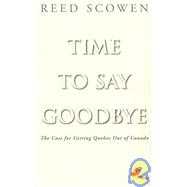
| A New Option | p. 1 |
| A Short Note on the Author | p. 9 |
| A Shocking Revelation | p. 14 |
| Bill 101: Claude Ryan to the Rescue! | p. 19 |
| A Competitive English Community | p. 27 |
| The Two Founding Nations | p. 41 |
| Quebec: A Nation-State | p. 50 |
| On Moral Bonds | p. 60 |
| Canada: In Prose | p. 71 |
| Canada: No Founding Anything | p. 78 |
| The Canadian Identity: A Moral Bond | p. 86 |
| The Republic and the Nation | p. 95 |
| The Process of Divestiture | p. 103 |
| Will the Rest of the Country Break Up? | p. 110 |
| The Future of the English in Quebec | p. 115 |
| How Do We Negotiate Divestiture? | p. 124 |
| How Do We Persuade Canadians That This Is a Good Idea? | p. 135 |
| How Can Quebec Be Removed from the Federation? | p. 142 |
| A Matter of the Heart | p. 148 |
| Notes | p. 155 |
| Bibliography | p. 165 |
| Acknowledgements | p. 170 |
| Table of Contents provided by Syndetics. All Rights Reserved. |
The New copy of this book will include any supplemental materials advertised. Please check the title of the book to determine if it should include any access cards, study guides, lab manuals, CDs, etc.
The Used, Rental and eBook copies of this book are not guaranteed to include any supplemental materials. Typically, only the book itself is included. This is true even if the title states it includes any access cards, study guides, lab manuals, CDs, etc.
Excerpted from Time to Say Goodbye: The Case for Getting Quebec Out of Canada by Reed Scowen
All rights reserved by the original copyright owners. Excerpts are provided for display purposes only and may not be reproduced, reprinted or distributed without the written permission of the publisher.